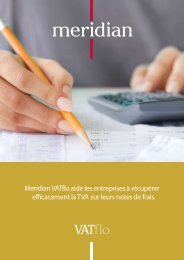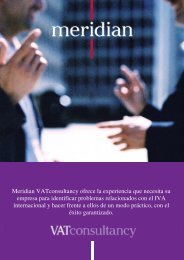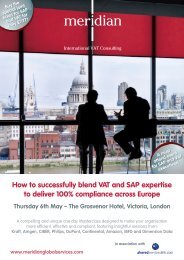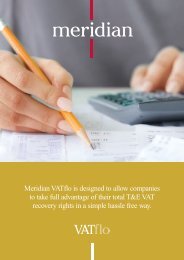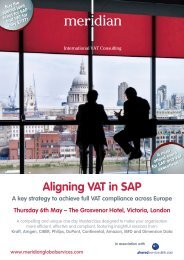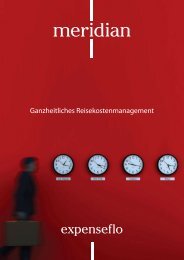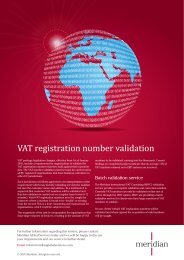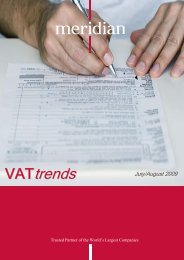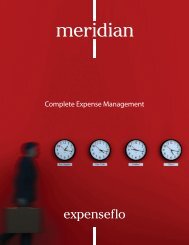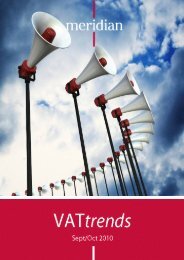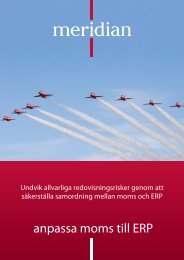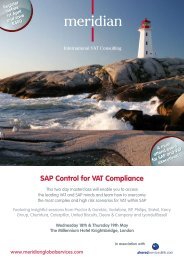trends - Meridian Global Services
trends - Meridian Global Services
trends - Meridian Global Services
Create successful ePaper yourself
Turn your PDF publications into a flip-book with our unique Google optimized e-Paper software.
VATttrreennddss<br />
SSeepptteemmbbeerr / / OOccttoobbeerr 2000099<br />
2
COUNTRY NEWS<br />
CZECH REPUBLIC<br />
VAT increase from 01.01.2010<br />
With effect from 1.1.2010, VAT rates in the Czech<br />
Republic will increase by 1%. The reduced VAT rate<br />
will be increased from current 9% to 10% and the<br />
standard VAT rate will increase from the current 19%<br />
to 20%.<br />
The approved VAT increase should help to fight the<br />
enormous budget deficit, which is faced by the Czech<br />
government due to the financial crisis.<br />
If you require assistance in implementing these<br />
changes into your business, please contact your usual<br />
<strong>Meridian</strong> contact for advice.<br />
DENMARK<br />
Update re deadlines for payment of the Danish<br />
VAT due in 2009<br />
In our July/August 2009 issue of VAT Trends we<br />
reviewed the Danish law proposal extending the<br />
deferral of VAT payments.<br />
As a consequence of the adoption of the proposal,<br />
businesses that pay VAT on a monthly or quarterly<br />
basis are allowed to defer their VAT payment for<br />
periods from August 2009 to December 2009.<br />
The new deadlines for payment of the Danish VAT due<br />
in 2009 and submission of VAT returns are as follows:<br />
VAT Return period Standard deadline Extended deadline<br />
September 2009 26 th October 2009 9 th November 2009<br />
October 2009 25 th November 2009 1 st December 2009<br />
November 2009 28 th December 2009 28 th December 2009<br />
Quarter 3 2009 10 th November 2009 1 st December 2009<br />
<strong>Meridian</strong> will keep you informed of any further updates<br />
in this regard.<br />
FINLAND<br />
Reduction of the reduced VAT rate<br />
With effect from 1 October 2009, the reduced VAT rate<br />
of 17% in Finland decreased to 12%. The reduction in<br />
the VAT rate will apply to food products sold in shops.<br />
The decrease is only a temporary measure. From July<br />
2010 the rate of 12% VAT is due to be increased to<br />
13%.<br />
VAT on food sold in restaurants will continue to be<br />
subject to the standard rate of 22% and is due to be<br />
decreased to 13% in July 2010.<br />
<strong>Meridian</strong> will keep you informed of any changes in<br />
VAT rates in Finland.<br />
FRANCE<br />
New VAT return filing dates for non-established<br />
businesses introduced from 1 January 2010<br />
A decree has modified the dates on which French VAT<br />
returns are due from companies not established in<br />
France, but who have a French VAT registration, and<br />
file their returns with the DRESG based in Noisy Le<br />
Grand.<br />
From 01 January 2010, the due dates for submitting<br />
the VAT returns will be as follows:<br />
Monthly returns: 19th of each month.<br />
Quarterly returns: 19 January, 19 April,<br />
19 July, 19 October.<br />
Annual returns: 4 May 2010.<br />
2
COUNTRY NEWS<br />
FRANCE<br />
Intrastat filing: Mandatory electronic submission<br />
for large businesses<br />
Currently, businesses may submit their French<br />
intrastat declarations (Déclarations d’Echanges de<br />
Biens) electronically or in paper format.<br />
In order to cut costs and improve the validity of the<br />
data provided, the French administration has put<br />
measures in place to ensure that large businesses<br />
submit their intrastat declarations electronically with<br />
effect from 1 July 2010.<br />
The details are as follows. Taxable persons, who:<br />
1. During the preceding calendar year had EC<br />
arrivals or dispatches at a net value of more<br />
than EUR 2,300,000 or,<br />
2. Breach this threshold during the current<br />
calendar year.<br />
Companies that will be affected by this change will<br />
receive an official communication in the first quarter of<br />
2010, and will be offered technical assistance.<br />
Companies should note that non-compliance with the<br />
new rules can result in penalties.<br />
If you require further assistance in relation to your<br />
compliance matters in France, please contact your<br />
<strong>Meridian</strong> Client <strong>Services</strong> Manager.<br />
GREECE<br />
Option to pay VAT liabilities in instalments<br />
The Greek authorities issued a new piece of legislation<br />
allowing businesses to pay the VAT due in their<br />
periodic VAT returns in three instalments. The first<br />
payment must represent at least of 30% of the total,<br />
and is to be made at the time of filing the return. The<br />
next payments are to be made monthly.<br />
This system gives some flexibility to businesses for<br />
which cash flows can be a major issue, but is also<br />
complemented by significant penalties if the payments<br />
are made late, or if the sums paid do not match the<br />
VAT return.<br />
If you wish to find out more about this subject, please<br />
contact your <strong>Meridian</strong> Client <strong>Services</strong> Manager.<br />
ITALY<br />
Increase of the distance selling and intra-<br />
Community<br />
acquisitions thresholds<br />
The distance selling and intra-Community acquisitions<br />
of goods thresholds have been increased as follows:<br />
Distance selling from Italy to another Member<br />
State: from €79.534 to €100,000;<br />
Distance selling from another Member State to<br />
Italy, from EUR 27.889 to 35.000;<br />
In respect of intra-Community acquisitions<br />
effected by non-registered taxable persons<br />
and non-taxable legal persons, from EUR 8,26<br />
to 10,000.<br />
PAKISTAN<br />
Proposal for the introduction of VAT<br />
The Pakistani government wants to implement a Value<br />
Added Tax (VAT) system in Pakistan in order to<br />
increase the country’s local tax revenues. Introduction<br />
is expected from the beginning of 2010.<br />
PORTUGAL<br />
Portuguese Authority set to implement a new VAT<br />
reimbursement process<br />
The Portuguese Tax Administration recently issued<br />
“Ordinance 23/2009”, which provides guidelines on the<br />
3
COUNTRY NEWS<br />
PORTUGAL<br />
Portuguese Authority set to implement a new VAT<br />
reimbursement process (cont.)<br />
new VAT reimbursement process, which came into<br />
effect in June 2009.<br />
The new process aims to reduce the guarantee costs<br />
connected with some VAT refund claims, and improve<br />
control of VAT refunds requested by taxpayers.<br />
Currently, the tax authorities require a bank guarantee<br />
for the first VAT refund and also when the taxable<br />
person ceases activity and files a final VAT refund<br />
claim. In order to reduce the guarantee cost, the<br />
Ordinance states that for taxpayers who cease<br />
activities or file the first VAT refund claim, it is no<br />
longer necessary to provide the tax authority with a<br />
bank guarantee or an equivalent type of collateral for<br />
the total amount of the refund.<br />
Conversely, if the taxpayer who ceases activity or files<br />
the first VAT refund claim, chooses to proceed with a<br />
bank guarantee, the reimbursement timeframe is<br />
decreased to 30 days instead of 90 days.<br />
With regard to improving the control of taxpayers, all<br />
VAT taxpayers requesting a VAT refund should fill in a<br />
VAT return claiming the reimbursement, within the<br />
legal period, along with a list of the following:<br />
1. Suppliers from whom acquisitions were made,<br />
including amount and the VAT related.<br />
2. Clients to whom the supply of goods of<br />
services were made.<br />
If the total amount of transactions below EUR5,000 is<br />
lower than 5% of all transactions stated on the form,<br />
then the supplier or client can summarize all<br />
transactions below EU 5,000 in one single line.<br />
In addition, the request for a refund requires various<br />
requirements to be completed:<br />
Taxpayer must not be in a Portuguese tax<br />
default situation.<br />
A bank account in the name of the company<br />
requesting the refund must be held.<br />
The refund claimed must be correctly filed.<br />
If your business requires assistance with the new<br />
reimbursement process, or any other queries in<br />
relation to the practical issues arising from this new<br />
process, please contact your <strong>Meridian</strong> Client <strong>Services</strong><br />
Manager or usual contact.<br />
SLOVAKIA<br />
Deductibility of VAT on passenger cars<br />
On 2 October 2009 a proposal relating to the<br />
deductibility of VAT on passenger cars was delivered<br />
to the Slovak Parliament. According to this proposal,<br />
restrictions preventing deduction of input VAT on<br />
passenger cars and accessories (air conditioning,<br />
alarms, airbags) should be abolished as of 1 January<br />
2010. If the proposal is approved, businesses will be<br />
entitled to recover input VAT incurred on purchases of<br />
all types of cars and related accessories.<br />
In addition to the simplification of rules for VAT<br />
deduction, this proposal also aims to improve the<br />
business environment and increase car sales in<br />
Slovakia.<br />
This proposal is subject to the normal approval<br />
process of the Slovak Parliament. <strong>Meridian</strong> will keep<br />
its readers informed of further developments in this<br />
area.<br />
SPAIN<br />
Spain set to increase its VAT rates from July 2010<br />
The Cabinet of Ministers has recently passed Spain’s<br />
2010 Budget Proposal. It approved the increase of the<br />
country’s standard rate of VAT from currently 16% to<br />
18%. The higher reduced rate of currently 7% will rise<br />
to 8%.<br />
4
COUNTRY NEWS<br />
SPAIN<br />
Spain set to increase its VAT rates from July 2010<br />
(cont.)<br />
Both rate changes will come into effect on 1 July 2010.<br />
Spain operates a system of three VAT rates:<br />
The standard rate of currently 16% is<br />
applicable to any taxable transactions that are<br />
not within the scope of the reduced rates or<br />
other exemptions.<br />
The reduced rate of currently 7% applies to<br />
hotel accommodation, restaurant services or<br />
admission to cultural events.<br />
The reduced rate of 4% is due on so-called<br />
“basic necessities” such as bread, fruit and<br />
vegetables. This rate is not set to change.<br />
If your business requires assistance with the change in<br />
the rate of Spanish VAT, e.g. in understanding how<br />
supplies covering the period before and after the rate<br />
change should be treated for VAT purposes, or any<br />
other queries in relation to the practical issues arising<br />
from a rate change both for the sale and the purchase<br />
of goods or services, please contact your <strong>Meridian</strong><br />
Client <strong>Services</strong> Manager or usual contact.<br />
SWITZERLAND<br />
Increase of VAT rates approved<br />
In a people’s referendum on 27 September 2009, an<br />
increase of the VAT rates was approved by a majority<br />
of 54.5% of the Swiss people.<br />
The increase in the VAT rate will apply from 1 January<br />
2011 until 31 December 2017, and will be as follows:<br />
Standard VAT rate to increase from 7.6% to<br />
8%;<br />
Reduced VAT rate to increase from 2.4% to<br />
2.5%; and<br />
Special reduced VAT rate to increase from<br />
3.6% to 3.8%.<br />
If you require any assistance in the practical<br />
implementation of these changes, please contact your<br />
usual <strong>Meridian</strong> contact.<br />
New VAT return form and annual VAT return from<br />
1 January 2010<br />
With effect from 1 January 2010, any business<br />
submitting VAT returns into Switzerland should have<br />
implemented the new Swiss VAT return formats in<br />
order to be compliant with the new Swiss VAT law<br />
(nMWSTG).<br />
Currently, all VAT return turnover figures are reported<br />
on part 1 of the Swiss VAT return form, part 2 contains<br />
the calculation of the VAT due.<br />
Additional details required on the VAT return form<br />
In line with the new regulations, taxpayers now have to<br />
report in more detail the following information by<br />
disclosing the relevant turnovers as a separate line<br />
item:<br />
Income generated from supplies of goods or<br />
services to recipients established outside of<br />
Switzerland where no Swiss VAT was charged<br />
(e.g. management services, consulting<br />
services, export of goods)<br />
Income generated from the transfer of<br />
business assets<br />
Correction of input VAT deducted where the<br />
supply became a self-supply<br />
Reductions due to subsidies must be declared<br />
in a separate input box<br />
Any other revenue, such as compensation<br />
payments, receipt of dividends or donations<br />
must also be separately reported<br />
New Annual VAT return<br />
Swiss taxpayers are currently only required to submit<br />
quarterly VAT returns. With effect from 1 January<br />
2010, Switzerland requires the submission of an<br />
annual return (fifth return), based on the calendar- or<br />
financial year of the company. Similar to the German<br />
annual VAT return, this return is a summary return,<br />
used to declare any corrections required to the input or<br />
output VAT figures.<br />
5
COUNTRY NEWS<br />
SWITZERLAND<br />
New VAT return form and annual VAT return from<br />
1 January 2010 (cont.)<br />
Adjustment of accounting systems<br />
VAT codes in your Swiss ERP systems will need to be<br />
aligned to reflect both the new place of supply rules for<br />
services, as well as aligning the turnover figures to the<br />
correct box on the new VAT return form.<br />
If you require assistance with the above, please do not<br />
hesitate to contact us via your usual channels.<br />
UNITED KINGDOM<br />
Changes to Intrastat thresholds from 1 January<br />
2010<br />
HMRC have confirmed that from 1 January 2010 the<br />
exemption thresholds for Intrastat declarations will be<br />
as follows:<br />
Intrastat arrivals has been increased from<br />
£270,000 to £600,000; and<br />
Instrastat dispatched has been reduced from<br />
£270,000 to £250,000.<br />
The revised thresholds will be implemented by a<br />
Statutory Instrument, which will be laid before<br />
Parliament in the coming weeks. The new thresholds<br />
will be effective from 1 January 2010, provided that<br />
Parliament does not have any objections to the<br />
changes.<br />
Compound interest claims on overpaid VAT<br />
The Upper Tribunal (Tax and Chancery Chamber) has<br />
decided in the case of the Compound Interest Project<br />
(“CIP”) that claims for compound interest should be<br />
made by way of a claim in restitution in the High Court.<br />
The CIP litigation involved five unconnected appellants<br />
that carry on business as motor dealers. VAT was<br />
overpaid on bonus payments made to them by car<br />
manufacturers and further output tax was overpaid on<br />
the sale of demonstrator cars which were used for the<br />
purpose of their businesses. Simple interest was paid<br />
out to the appellants, however the appellants argued<br />
that section 78 of the VAT Act 1994 (provision relating<br />
the payment of interest in respect of output tax claims)<br />
should provide for compound interest.<br />
The Upper Tribunal held that whilst they accepted that<br />
compound interest is required under Community Law,<br />
the “natural construction” of section 78 only provides<br />
for simple interest. It was also held that the Tribunal is<br />
under no obligation to give effect to Community law as<br />
English Law already allows for a claim in restitution to<br />
be made in the High Court.<br />
For taxpayers that that are awaiting a conclusion on a<br />
Conde Nast/Fleming claim, consideration should be<br />
taken as to whether it would be worthwhile submitting<br />
an appeal to the Tribunal for compound interest, within<br />
30 days of receiving notification that simple interest will<br />
be paid. Where claims have already been paid out,<br />
taxpayers should evaluate whether a claim ought to be<br />
made to the High Court (subject to a cost-benefit<br />
analysis).<br />
For more information, or if you have any questions<br />
concerning such claims, please contact your <strong>Meridian</strong><br />
Client Service Manager or your local <strong>Meridian</strong> office,<br />
for a list of offices worldwide, please go to<br />
www.meridianglobalservices.com.<br />
Online VAT returns mandatory from 1 April 2010<br />
Filing VAT returns online will become compulsory from<br />
1 April 2010. The new rules will apply to existing<br />
businesses with an annual turnover of £100,000 or<br />
more, and to all newly registered businesses<br />
(regardless of their turnover). Any VAT due must also<br />
be paid electronically if returns are submitted<br />
electronically.<br />
6
COUNTRY NEWS<br />
UNITED KINGDOM<br />
The 15% rate will be granted for all takings received<br />
up to the earlier of:<br />
the end of trading on 31 December; or<br />
Tax concession for charities 6am on the morning of 1 January 2010.<br />
HM Revenue and Customs (HMRC) announced in<br />
Revenue & Customs Brief 39/09, issued on 1 July<br />
2009, that the “charitable building” concession will be<br />
withdrawn on 1 July 2010.<br />
At present, charities pay no VAT on the acquisitio n or<br />
construction of a new building if at least 90% of the<br />
building is used for charitable purposes. To determine<br />
the use, one of four different methods could be used.<br />
HMRC will now accept that the conditions for “solely”<br />
are met if the relevant use of the building is 95% or<br />
more. Any method, provided that it is “fair and<br />
reasonable”, can be used to calculate the qualifying<br />
use.<br />
There is a transitional period of 12 months from 1 July<br />
2009, in which charities have a choice of using either<br />
the old extra-statutory concession, or the new 95%<br />
limit.<br />
Tour Operator’s Margin Scheme<br />
As we have advised previously, the implementation of<br />
the changes to TOMS, originally due to be introduced<br />
from 1 April 2009, has been delayed. The changes will<br />
now take effect from 1 January 2010.<br />
The changes affect the market valuation of in-house<br />
supplies (following the case of MyTravel C-291/03 the<br />
use of market valuation will become compulsory),<br />
supplies to business customers for own consumption<br />
(the “opt out” provision will no longer apply) and<br />
supplies to business customers for resale (the “opt in”<br />
provision will not longer apply).<br />
VAT rate freeze for retailers and phone companies<br />
HMRC have announced that they will grant an<br />
extension to pubs, clubs, restaurant, hotels and mobile<br />
phone operators to charge VAT at 15% until 6am on<br />
New Year’s Day.<br />
The extension will only be available to businesses that<br />
are open at midnight on 31 December 2009, which<br />
account of VAT at the point of sale. It will not apply to<br />
mail order or on-line retailers.<br />
7
EU NEWS<br />
EUROPEAN UNION<br />
Carousel fraud: Measures proposed by the<br />
Commission of the European Communities<br />
In order to fight against tax fraud, specifically against<br />
Carrousel fraud, the Commission of the European<br />
Communities has proposed an optional and temporary<br />
application of the reverse charge mechanism to<br />
specific goods and services. This disposition will<br />
amend Directive 2006/112/EC by inserting Article 199<br />
a. 1<br />
In addition to this article, Annex VI A will list the goods<br />
and services referred to in Article 199a. This list has<br />
been set up based on fraud sensitive goods and<br />
services, which were subject to recent carousel fraud<br />
cases reported by the Member States. The list<br />
includes items such as mobile phones, integrated<br />
circuit devices, perfume, precious metals and<br />
allowances to emit greenhouse gases.<br />
It has to be highlighted that this change does not alter<br />
the principle of the VAT system, the items possibly<br />
subject to the reverse charge remains limited in scope.<br />
Member States can only adopt this measure for three<br />
of the categories listed in the Annex VI A.<br />
Furthermore, the duration to allow this mechanism is<br />
limited to 31 December 2014. If a Member State<br />
decides to introduce this measure, VAT due on those<br />
goods and services will be payable by the person<br />
(business clients only) to whom they are supplied.<br />
Official position of the EU Commission on VAT<br />
groups published<br />
VAT grouping is provided for in Article 11 of Directive<br />
2006/112/EC.<br />
In a 12-page document, the Commission clarifies that<br />
VAT group schemes were initially created as a<br />
simplification measure for businesses.<br />
1<br />
Proposal for a Council Directive amending Directive<br />
2006/112/EC<br />
However, the disparity in the rules implemented by the<br />
various Member States represent a real risk of tax<br />
evasion and legal uncertainty for businesses operating<br />
in more than one Member State.<br />
The Commission is therefore reiterating the basic<br />
principles for VAT grouping, and provides a very<br />
interesting insight into some of the concepts on which<br />
those rules are based, such as the necessary financial<br />
and organisational links between group members.<br />
It is also clear from this communication that the<br />
Commission expects Member States to adopt a stricter<br />
approach to ensure that the rules governing the<br />
creation of VAT groups and the right of deduction are<br />
implemented correctly, but also to use anti-avoidance<br />
measures to combat abusive practices.<br />
This communication is available on the Europa<br />
website and could potentially be a useful tool for any<br />
company that is considering entering into a VAT group<br />
as it explains the boundaries in which such provisions<br />
should be used and gives an overview of the directions<br />
that will be taken on a European level in the future<br />
regarding VAT grouping schemes. The official<br />
document name is IP/09/1078, and you can also find<br />
this in Communication COM/2009/325, or follow this<br />
link.<br />
8
CASES OF INTEREST<br />
DEVELOPMENTS AT THE EUROPEAN COURT OF<br />
JUSTICE<br />
ECJ Referral<br />
Failure to maintain proper VAT Records – Input<br />
VAT restriction<br />
Referral in Case C-188/09 (Dyrektor Izby Skarbowej w<br />
Białymstoku v 'Profaktor' Kulesza, Frankowski,<br />
Trzaska spółka jawna w Białymstoku) – VAT Records<br />
– 30% Input VAT restriction for failure to maintain –<br />
Input VAT.<br />
The Issue<br />
Whether compliance measures adopted by Poland to<br />
restrict input tax recovery for failure to maintain<br />
adequate VAT records is compatible with EC law.<br />
Questions referred<br />
A Polish Court has referred questions to the ECJ<br />
concerning VAT compliance measures and whether it<br />
would be incompatible with EC law to introduce a<br />
temporary forfeiture of the right to reduce the amount<br />
of tax due by an amount equivalent to 30% of the input<br />
tax who fail to fulfill the obligation to keep records of<br />
turnover and amounts of tax due by using cash<br />
registers.<br />
ECJ Referral<br />
Dispatch of ex-warehouse goods – Place of supply<br />
and scope of exemption<br />
The Issue<br />
In a chain of supplies, which supply is an “intra-<br />
Community transport of goods” that qualifies for VAT<br />
exemption.<br />
Questions referred<br />
The case concerns goods sold on an ex-warehouse<br />
basis, with the buyer re-selling to a final purchaser<br />
prior to dispatch.<br />
The Tax Authorities was of the view that exemption<br />
would only apply between the sale between the buyers<br />
and the final purchaser and not between the<br />
originating seller and the buyer.<br />
The seller has appealed the decision, with the Dutch<br />
Supreme Court referring to the ECJ on which supply<br />
the intra-Community transport exemption should be<br />
allocated to.<br />
ECJ Referral<br />
Supply of contractual rights in the context of time<br />
share points – Liability of supply<br />
Referral in Case C-270/09 (Macdonald Resorts<br />
Limited v The commissioners for Her Majesty’s<br />
Revenue & Customs) – Time share points scheme –<br />
Characteristics of supplies of contractual rights –<br />
Liability of supply.<br />
The Issue<br />
Whether a timeshare points scheme is a VAT-exempt<br />
supply of immovable property or a taxable service.<br />
Questions referred<br />
The Scottish Court of Session’s main question is<br />
whether the characteristics of supplies of contractual<br />
rights (‘Points Rights’) are that of leasing or letting of<br />
immovable property, a membership of a club or<br />
another supply for VAT purposes. Following on from<br />
this, the ECJ has also been asked what factors affect<br />
the characterization of the supply.<br />
ECJ Referral<br />
Cross border leasing of motor cars – Abusive VAT<br />
practices<br />
Referral in Case C-227/09 (The commissioners for Her<br />
Majesty’s Revenue & Customs v RBS Deutschland<br />
Holdings GmbH) – Cross-border leasing of goods –<br />
Whether arrangement can be viewed as abusive<br />
practice to obtain a tax advantage – Recovery of input<br />
tax.<br />
9
CASES OF INTEREST<br />
ECJ Referral<br />
Cross border leasing of motor cars – Abusive VAT<br />
practices (cont.)<br />
The Issue<br />
Whether a cross-border car leasing arrangement that<br />
allows the recovery of input tax without the payment of<br />
output tax under national laws constitutes an abusive<br />
practice.<br />
Questions referred<br />
Based on a specific set of facts that involve a UK bank<br />
and its German subsidiary purchasing and leasing<br />
cars cross-border, the Scottish Court of Session<br />
referred questions as to whether such an arrangement<br />
constitutes an abusive practice. The arrangements<br />
allowed the taxpayer, in accordance with national law,<br />
to recover input tax on the purchase of cars without<br />
having to charge output tax.<br />
ECJ Referral<br />
Payment processing services – Scope of<br />
exemption<br />
Referral in Case C-27/09 (T-Mobile (UK) Ltd v The<br />
commissioners for Her Majesty’s Revenue & Customs)<br />
– Transferring funds through payment processing<br />
services – Liability of supply.<br />
The Issue<br />
Whether the transfer of funds entailing a change in the<br />
legal and financial situation is an exempt supply.<br />
Questions referred<br />
The UK High Court has questioned the characteristics<br />
of an exempt services that has ‘the effect of<br />
transferring funds and entails changes in the legal and<br />
financial situation’, in particular debit / credit<br />
adjustments that are carried out.<br />
ECJ Referral<br />
Criminal proceedings<br />
Referral in Case C-285/09 (R) – Refusal to allow VAT<br />
exemption – VAT evasion.<br />
The Issue<br />
This relates to criminal proceedings aimed at refusal<br />
for VAT exemption.<br />
Questions referred<br />
Whether VAT exemption under Article 28cA(a) of the<br />
Sixth Council Directive (exemption for intra-Community<br />
supply of goods) can be refused on the objective<br />
factors that the supplier:<br />
a) knew that, by his supply, he was participating<br />
in a transaction aimed at evading VAT, or<br />
b) took actions aimed at concealing the true<br />
identity of the person to whom the goods were<br />
supplied in order to enable the latter person or<br />
a third person to evade VAT?<br />
ECJ Case Law Update<br />
Selling reinsurance for consideration – Place of<br />
supply and scope of exemption<br />
Judgment in Case C-242/08 (Swiss Re Germany<br />
Holding GmbH v Finanzamt München für<br />
Körperschaften) – Insurance and reinsurance<br />
transactions – Transfer of a portfolio of life<br />
reinsurance contracts for consideration to a person<br />
established outside the EU – Place of supply<br />
The Issue<br />
Whether a transfer of a portfolio of reinsurance<br />
contracts from a reinsurer established in Germany to<br />
its associated company in Switzerland is subject to<br />
VAT.<br />
The Judgment<br />
The ECJ ruled that the transfer constitutes a supply of<br />
services, which cannot be treated as a VAT exempt<br />
10
CASES OF INTEREST<br />
ECJ Case Law Update<br />
Selling reinsurance for consideration – Place of<br />
supply and scope of exemption (cont.)<br />
supply of an “insurance or reinsurance transaction” or<br />
a “financial transaction”. The transfer is therefore a<br />
supply of services taxable where the supplier is<br />
established (German VAT at 19% was therefore<br />
applicable).<br />
The reasoning given was that there was no contractual<br />
relationship between the German reinsurer and its<br />
associated company for the contract of reinsurance<br />
and the transfer was a single service from an<br />
economic viewpoint, which cannot be artificially split<br />
into a financial dealing and a transaction concerning<br />
debts to be a “financial transaction”.<br />
Based on the ruling in this judgement it is not only<br />
important for any insurer/ reinsurer involved in such<br />
transactions to ensure that they structure their<br />
contracts effectively but to also consider the impact<br />
that the VAT Package would have, i.e. from 1 January<br />
2010 the customer in Switzerland would self-assess<br />
the VAT due at 7.6% as opposed to incurring<br />
irrecoverable German VAT at 19%!<br />
ECJ Case Law Update<br />
Selling a subsidiary – VAT may be recoverable<br />
Judgment in case C-29/08 (Skatteverket v AB SKF) –<br />
VAT incurred in the TOGC of a subsidiary may be<br />
recoverable – businesses should consider reclaim<br />
opportunities.<br />
The Issue<br />
Whether input tax is recoverable on the sale of shares<br />
in a subsidiary company.<br />
The Judgment<br />
This is the first time that the ECJ has made a<br />
judgement specifically on the VAT treatment of the<br />
sale of shares (Kretztechnik C-465/03 concerned the<br />
VAT treatment of the issue of shares in order to raise<br />
capital and BLP C-4/94 did not specifically address the<br />
VAT treatment of the sale of shares (although it did<br />
state that any associated input tax is irrecoverable).<br />
The ECJ ruled that a sale of shares can either be a<br />
VAT exempt sale of shares or a TOGC (provided the<br />
TOGC criteria is fulfilled, namely that the company<br />
selling the shares must be providing active<br />
management services to the subsidiary in which it is<br />
selling).<br />
If the sale of the shares can be treated as a TOGC,<br />
any related input tax is recoverable according to the<br />
seller’s overall activities, i.e. if it is a fully taxable<br />
business, all related input tax would be deductible.<br />
Where the sale of the shares constitutes an exempt<br />
supply, it is up to the national court to decide whether<br />
the associated input tax has a direct and immediate<br />
link to the exempt supply. If it does, the input tax is<br />
irrecoverable.<br />
Businesses involved in such transactions that have<br />
incurred related input VAT should consider if they have<br />
an opportunity to recover some of these costs. If you<br />
would like to discuss this issue further, please contact<br />
through your normal channels.<br />
11
MERIDIAN WEBINARS<br />
VAT Package<br />
<strong>Meridian</strong> delivers advanced webinars on practical<br />
issues in respect of the VAT Package rules.<br />
Please see below links to our recordings<br />
<strong>Meridian</strong> Webinar on The Refund Directive. What is<br />
changing and how it will work - a practical insight.<br />
Delivered in: June 2009<br />
Recording link English<br />
Recording link French<br />
Recording link German<br />
Advanced webinar on 2010 "Place of Supply" -<br />
addressing complex implementation issues.<br />
Delivered in: November 2009<br />
Recording link English<br />
Recording link French<br />
Recording link German<br />
12
<strong>Meridian</strong> <strong>Global</strong> <strong>Services</strong> Head Office<br />
Tallaght Business Park,<br />
Tallaght, Dublin 24,<br />
Ireland<br />
Tel: 353 14590 500<br />
Fax: 353 14590 540<br />
Website: http://www.meridianglobalservices.com/<br />
Contact Editorial Committee:<br />
Vat<strong>trends</strong>@meridianglobalservices.com<br />
All content, interpretations opinions and suggestions contained within this<br />
publication are made based on the information to hand at the time of<br />
publication and are those of VAT<strong>trends</strong> editorial committee and should in no<br />
way be taken as definitive opinions. Should you require a specific opinion of<br />
how any information contained within may impact your business please<br />
contact your local <strong>Meridian</strong> representative directly.<br />
Barcelona Belgrade Berlin Bogota California Chicago Dublin Hamburg<br />
Istanbul London Lyon Milan Munich Napoli New York Nicosia Osaka<br />
Oslo Paris St Petersburg Porto Sao Paolo Seoul Stockholm Tokyo<br />
Toronto<br />
Trusted Partner of the World’s Largest Companies




